Welcome November!!!
It is hard to believe we are already entering the eleventh month of the year, and it is also true that the autumn season with its wonderful colors is almost gone…
As the harvesting season is coming to an end, we have heard from gardeners a number of rewarding stories about this time of the year. The whole of September and most of the first weeks of October have kept them busy collecting their products and bringing home delicious tomatoes, peppers, kale, lettuce, cucumbers, cabbage, bok choy, squash, carrots, onions, beets, radishes, and more. Some folks said they are still saving seeds, while others are more focused on taking down their plots and preparing the garden for winter, by using cover crops, cardboard, and organic matter to build the beds and paths for next year’s growing season. Many experienced gardeners know the many benefits of the bed-building, nutrient-adding, cover-cropping, lasagna gardening, and tarping that must be done during this time of the year – doing these activities will help make next spring’s garden prep so much easier and more effective. If you want to learn some tips to take care of your garden during the winter, click here: Tips- for-winter
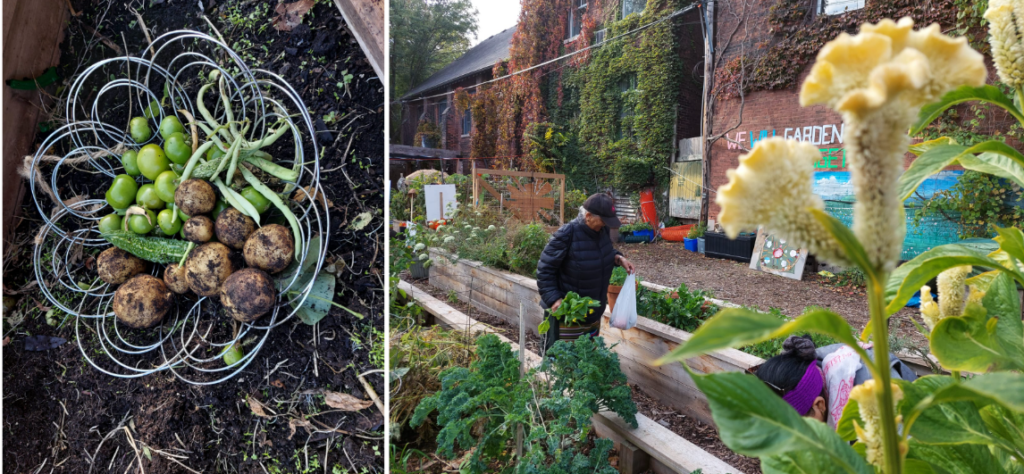
Upcoming Events
Eco Fair
Greenest City has been invited to join the 2023 edition of Eco-Fair Toronto this Sunday, November 5. We will be setting up a table to promote our work and include a vermicomposting showcase to introduce people to the wonderful role worms play in producing soil. If you get a chance to come by, it would be nice to see you there.
See more details here: https://ecofairtorontg/
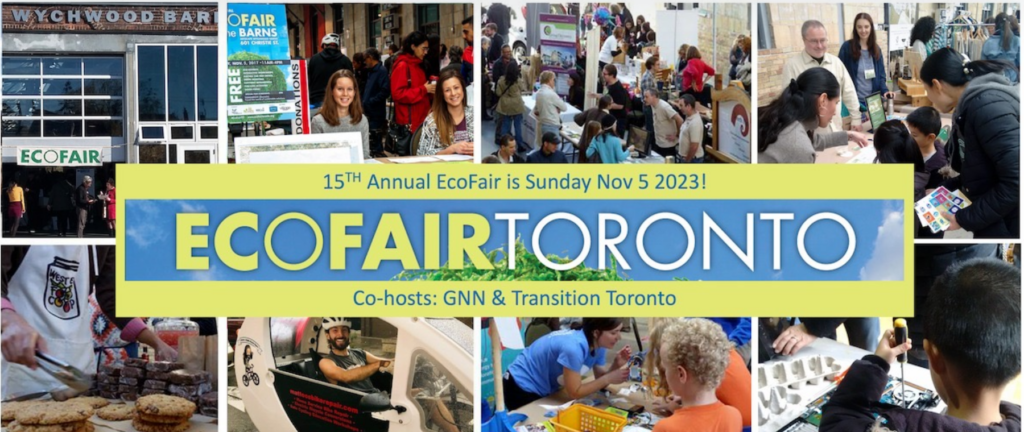


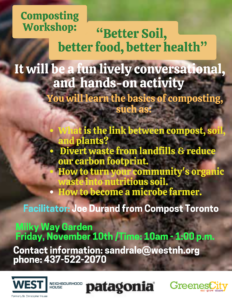
Compost Workshop: “Better soil, better food, better health”
If you want to learn what you need to compost using the “Three-bin structured composting method”, this is the perfect time to build a pile of compost that will be ready when you come back to your garden next spring. In this educational workshop, you will learn the basics of composting. You will know what compost is, and you will learn what some of the other common forms of composting are and which one will work best for your home, garden, and community. You can register here: Three bins Compost Workshop/ Registration form
Facilitator background:
Joe Durand is an associate of Compost Toronto, a grassroots organization that supports growing food educational initiatives and he is also a member of the Soil Food Web school of Dr. Elaine Ingham, He is currently studying how to assess the quality of soil biology using a microscope. “Come from a family of farmers and have witnessed the decline of soil life on the original family farm during my lifetime, I was moved as a young man by stories of how composting transformed communities by increasing soil fertility and food security. Healthy soil and good compost is alive! You can see the life racing about under a microscope, Composting is growing this life. I have been studying compost and soil for three years and making compost piles in local community gardens, school gardens, and my own backyard for over a decade. To say I am passionate is an understatement, I want to introduce as many people as I can to the amazing mystery of composting and soil building,” – Joe.
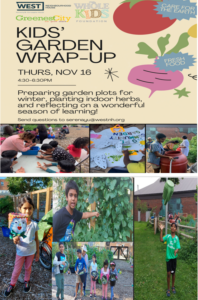
Kids programs wrap up
Last summer we successfully ran 12 weeks (about 3 months) of kids’ activities which included about 30 children and 10 parents in attendance.
This season on November 16 we will have our Kids’ Gardening Wrap-Up Event! To end off all the wonderful learning and planting over the summer, the kids will be clearing the garden plots to prepare them for the winter and learning about planting indoors through the cold weather. They will use their eco planters designed in summer and we will provide lemon balm. It will be a fun afternoon with our hands in the soil, possibly for the last time before the snow comes this year!
We want to acknowledge the Whole Kids Foundation for supporting our Growing the Future Kids Gardening program this year. Your support has had a positive impact on the community of Parkdale.
Farewell to our former gardeners from Hope Garden
Since 2021, the City of Toronto has mandated that HOPE gardeners would have only a 3-year contract, in order to allow more Parkdale residents to get a plot in the garden. It means that this year most of the former gardeners are leaving and which will mean an opportunity for people on the waiting list. We are excited to welcome new folks next year but at the same time, it is with a heavy heart that we must say goodbye to people that are departing because we have thoroughly enjoyed having all of them as a part of our gardening team. We want to acknowledge the dedication, knowledge, and skills they have brought to the Hope Garden and reciprocally, we are also very grateful for the positive impact that the Garden has had on their physical, mental, and emotional well-being.
The Good news is they will stay connected with Greenest City, with many expected to attend our programming, including the Harvest Festival, Seedy Saturdays, workshops, potlucks, and more! If we have some space in our communal areas in the gardens, they will be welcome to join us because their passion for growing food is amazing and has not gone unnoticed.

August 11, 2023.
Hope Garden Waiting List Process
If you are interested in applying for a plot in the Hope Garden you need to meet some criteria
1. Being a Parkdale resident.
2. Don’t have a plot in any other place to grow food
3. People must wait until plots are available
4. People can use the plot for a period of 3 consecutive years
At this time we have a waiting list of approximately 50 people, anybody who meets the requirements can apply to get a plot in Hope Garden, Please contact the Greenest City program coordinator at sandrale@westnh.org
Updates & Ongoing activities
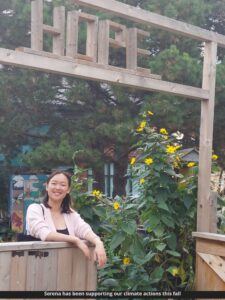
Fall Placement Student:
Serena Yuan is a fourth-year undergraduate student of Environmental Science at the University of Toronto, who joined us at the beginning of September. She will be supporting Greenest City’s programs until the middle of December. Despite being a city gal, she loves the peace and the freshness to be found in gardens! If you see her at Greenest City events or around the gardens, please say hello and give her your best gardening advice (especially for growing vegetables on apartment balconies). She is excited to get to know everyone and contribute to the wonderful Parkdale community!
Psychia-Tree: Eco-Therapy
West NH/Greenest City has partnered with psychiatrist Dr. Nate Charach to run a 6-week ecotherapy program. The psychia-tree group is based on Joanna Macy’s Work That Reconnects, which can be found in her books “Active Hope” and “Coming Back to Life”. These groups combine a deep understanding of group psychotherapeutic principles and nature-based healing practices. So far, we have held 4 sessions providing participants with tools to understand the connection between mental health distress, emotions, and the work that reconnects and how these relate to the challenges in our world. It has invited us to reflect on the benefits of viewing the world through threads of adventure, and gratitude, honoring our pain, and engaging in active hope. It is scheduled for two hours every two weeks in the Milk Way Garden. We have two more sessions left and will launch a new callout to start a new group in the spring.
Learn more about Dr. Nate’s perspectives here: psychiatree.beehiiv.com
Please reach out to sandrale@westnh.org if you want more information about next year’s groups.


Pollinator Garden at Milky Way:
Greenest City program is recognized for developing projects that help to maximize growing food in community gardens while restoring urban ecosystems. As part of our climate actions, at the beginning of the autumn, we partnered with Tranquility Garden Design to establish in the Milky Way space our Pollinator Garden: “Beyond Pollen—A garden for birds, bees, beetles, flies, and caterpillars and hummingbirds”. This garden was funded with support from Patagonia and Whole Kids. This garden represents a strategy to support the well-being of pollinators and other important beings that play an important role in preserving our green urban environment. Our wonderful designer, Rebecca Catching, Director of Tranquility Garden Design, shared some ideas and thoughts that reflect our approach to setting up our pollinator Garden.
“In designing this garden, I cross-referenced several studies, articles, and pollinator garden guides written by horticulturalists and entomologists. The result is a garden of perennials, bushes, sedges, and grasses to support insects and butterflies at various stages of their lifecycles. Some plants provide nectar and pollen for bees, flies, hummingbirds, and butterflies. Other plants are hosts to butterfly and moth eggs. When the caterpillars emerge, they can feast on a buffet of leaves before spinning a cocoon and pupating. The garden also includes grasses and fruiting bushes which provide berries and seeds to support local birds throughout the fall and winter months. It contains over 40 types of plants to maximize species diversity. We’ve included plants such as Pussy Willows which provide an early source of nectar for between 14-18 insects, Canada Goldenrod which attracts a large number of hoverflies in the fall, and plants such as Physostegia virginiana (Obedient Plant) which can sometimes be found blooming as late as December. Based on a 2019 study in the Journal of Insect Conservation, we also included 4 non-natives which were found to be incredible pollinator magnets. Catmint was the standout of the study due to its long blooming period, attracting 112 insect visits per week. Sneezeweed is known to attract the largest number of honeybees and Geranium ‘Rozanne, attracted the largest number of solitary bees.
Watching bees dance around collecting pollen on their legs, and butterflies dipping their long proboscises into the delicate structure of a flower is both a fascinating and relaxing activity. For those interested in learning more about what they are seeing, the iNaturalist App supported by National Geographic, the Canadian Wildlife Federation, and the ROM is a great way to learn to identify plants and insects. Post your findings in the APP and help contribute to our understanding of the natural ecology of Parkdale.“



We are glad we got such insightful landscaping design from Rebecca and her crew to implement our first pollinator garden in the Milky Way community garden.

This is just the beginning of a long learning journey aimed at acknowledging the intrinsic relationship between plants, incepts, birds, soil, land, food, humans, and of course the biocultural diversity that underlies all of them. Since we have a strong commitment to reconciling with this land -including the non-human beings such as pollinators- and with the Indigenous people, the last phase of this project is the signage piece which will include names in Anishinaabe and in English. Next spring, people will be able to visit the garden not only to learn the names of the species in both languages. but also to realize that behind a botanical name from an indigenous perspective, there is a history and story of that species that tells us about the whole territory including “all our relations”
Previous Events
Harvest Potluck Celebration
We all love our traditional Harvest events because that is our opportunity to share time, company, food, stories, and memories. Gratitude to all the folks who joined us on October 19 for our 2023 Harvest Potluck Celebration. It was amazing seeing Greenest City friends, gardeners, partners, and volunteers sharing such a wonderful time together in the Milky Way Garden. This year, we had a great turnout with more than 150 people including citywide and Parkdale participants, 30 volunteers, 7 organizations, local performers, Indigenous guides, and tons of yummy and cultural food.

The music was very beautiful and the performers were inspiring. Thank you so much to the local musicians, Parkdale Musicians Collective, Tibetan dancers, elders & youth, from Parkdale, the Aztec Indigenous dances, and the Monarch Butterfly project. Thank you also to our partner organizations Parkdale Queen West Community Health Centre, Working for Change, Access Alliance, Opens Doors, Parkdale People Economy, Parkdale Neighborhood Land Trust, and FoodShare.




Organizing a big event such as the annual Harvest requires a lot of work. Without our volunteers and community members’ support, it would be almost impossible to get it done! A big shoutout to all of the people who worked together for their dedication and enthusiasm, to make it happen.
Once again, we have reaffirmed our commitment to opening spaces that support social justice while claiming our right to food, connecting ourselves to land and seasons. This event is part of our climate action journey intended to righting relations with the earth and Indigenous people, and locating food, cultural diversity, and meaningful relationships at the core of our community development vision.

Truth & Reconciliation
“This year, Greenest City observed the National Day for Truth and Reconciliation on a sunny Friday at Masaryk Park. I sat at a booth with Beryl-Ann, a wonderful social worker with plenty of wisdom and experience, offering educational resources and activities for reflection to community members passing by. As a student, I have always spent this holiday in the classroom, and I am glad to have spent it outdoors with the trees and the garden just behind me this year. Being a settler, I wasn’t sure how to approach setting up the booth. I am by no means an expert on Indigenous affairs, relations, or knowledge, and I wondered what I could offer that would support meaningful reconciliation. I realized that my contribution would be my time, effort, and intentions; the work of reconciliation is a collective effort after all, and my attempt to spread awareness was supporting rather than overshadowing the voices of Indigenous peoples.
I was fortunate to speak with a passerby who reflected that. This year, events for Truth and Reconciliation were celebrating Indigenous culture and resilience while focusing on the path forward. In previous years, events just focused on spotlighted Indigenous suffering and trauma. To me, this signaled that we are beginning to move away from performative activities and the harmful narrative of white saviorship, which we must nonetheless remain vigilant to avoid. Speaking with community members also taught me that discussions prompt much more meaningful reflection than simply thinking to myself; when talking to another person, you are accountable for a thoughtful and complete answer, whereas we tend to avoid challenging or uncomfortable thoughts in our own head”.
By Serena Yuan. UofT Placement Student.

Choosing Hope Garden’s new Steering Committee.
On September 13, we met with Hope Gardeners in Masaryk Park to vote on the new Steering Committee for the garden for the period September 2023 to September 2024. We started our meeting by acknowledging Zorida Mohamed, Aida Maines, Dilber Tahir, and Angela Fedele, members of the previous Steering Committee for all their contributions. We also got some time to express words of gratitude, including awarding certificates of recognition to former gardeners whose contracts will end this year. We reminded them of the different ways they can stay involved in Greenest City. After summarizing the roles and responsibilities of the garden coordinators, we proceeded to vote for the new Steering Committee by giving people the options to follow a voting process: 1. Democratically propose random names. 2. Gardeners could propose voluntarily their own name, 3. If numbers 1 or 2 did not work ,we would do a Raffle.
After Adi Yamane, Rahma Idriss, and Dilber Tahir, proposed their names, we chose option number two and all gardeners formally voted for this new Steering Committee. We are very grateful for them taking on the challenge of the Hope Garden Steering Committee, and we look forward to the leadership and skills they will bring to the garden. Thank you to the three of you. Next year in spring, we will vote on two new gardeners to join the team.
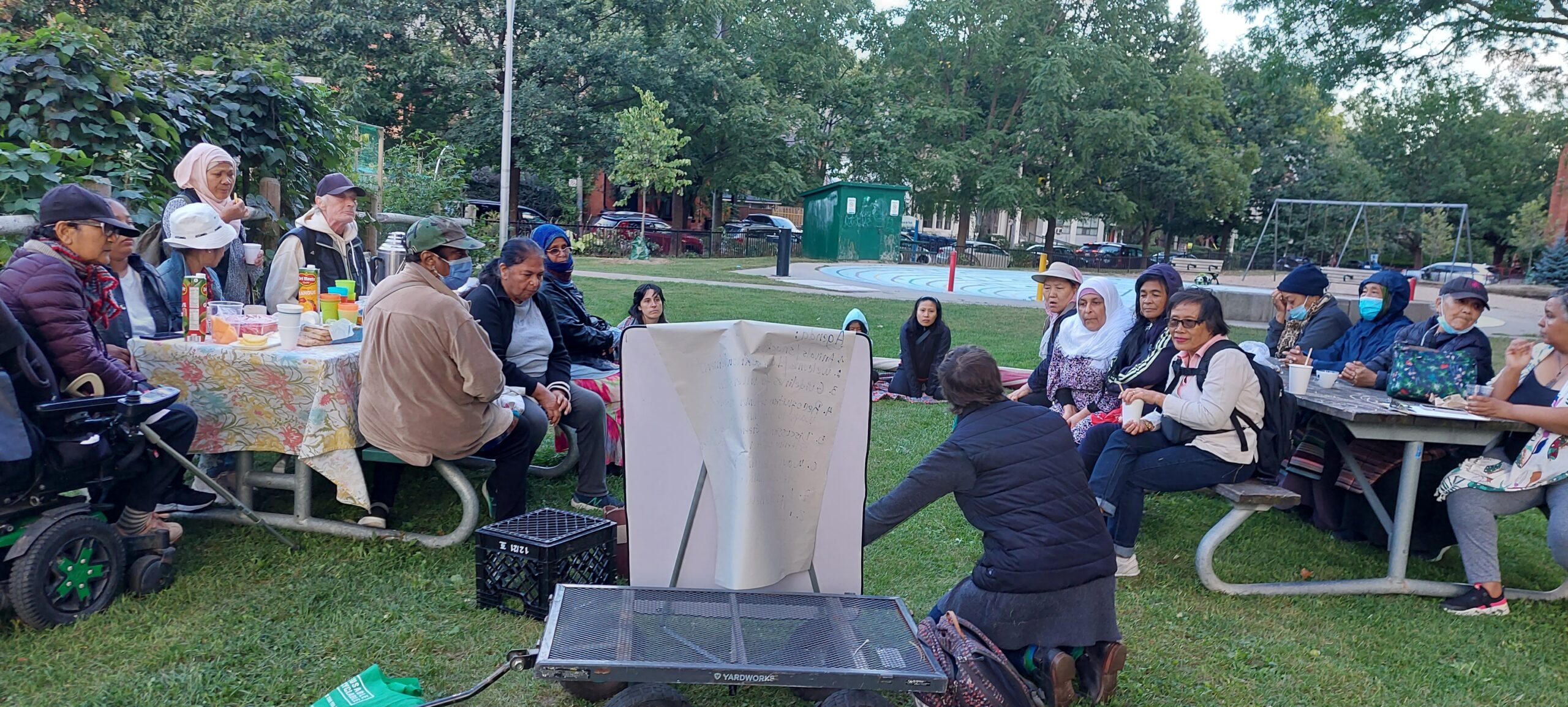
Biocomplete Compost Workshop. August 18.
“When I hear Biocomplete Compost, I think of a highly diverse community of microorganisms living together and regenerating the soil, turning it into a highly organic product. It can be added to existing soil/compost to develop and maintain a thriving ecosystem.
In the workshop, we learned how to analyze soil under a microscope, how to create an extract (a compost tea) from biocomplete compost, how traditional composting methods compare to biocomplete composting, and so much more. It was a great learning experience and I highly recommend people join future workshops. We ended up getting buckets of complete compost to take home with us. I spread mine in my garden plot at St Joseph’s Community Garden and also in the St Joseph’s Compost Pile.”
Testimonial by Peter Gad from St Joe’s Garden.
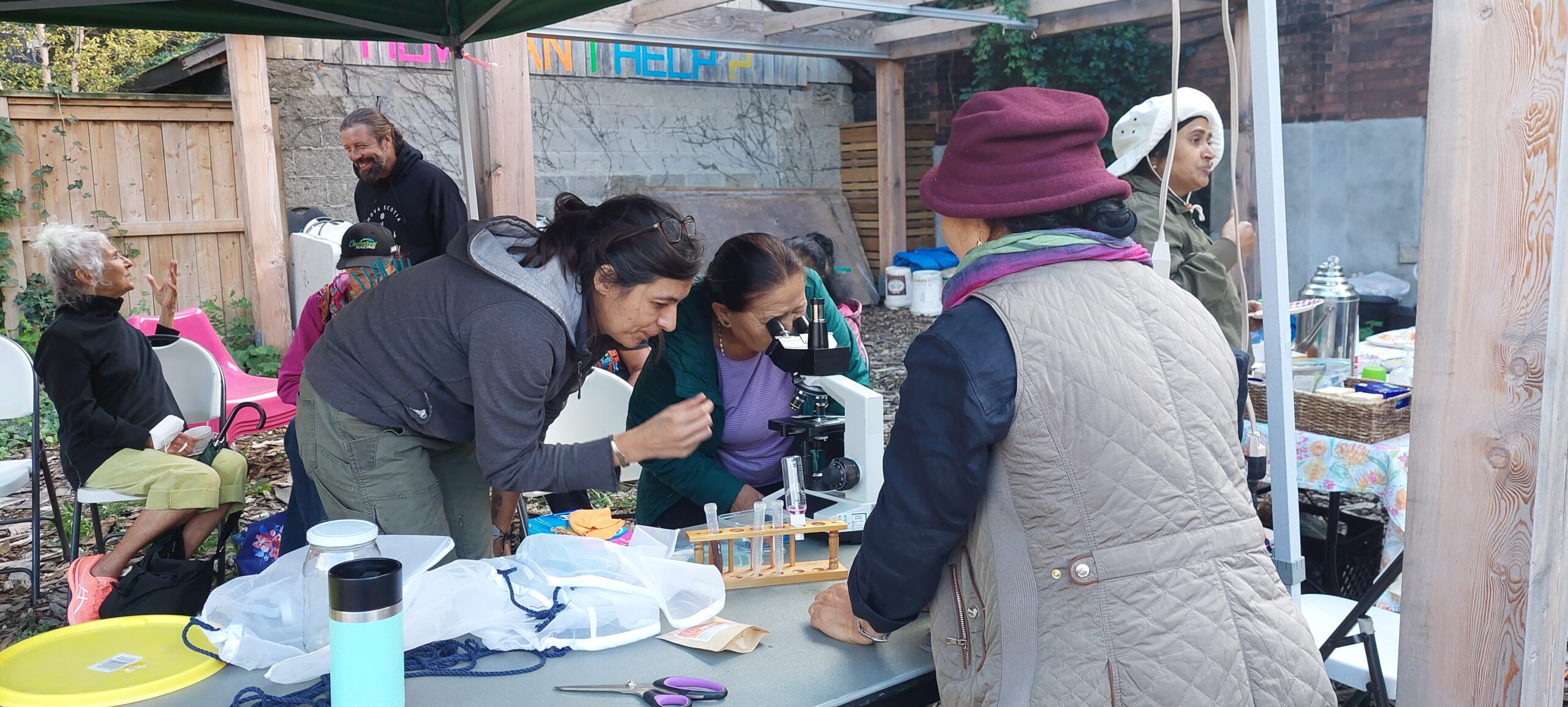
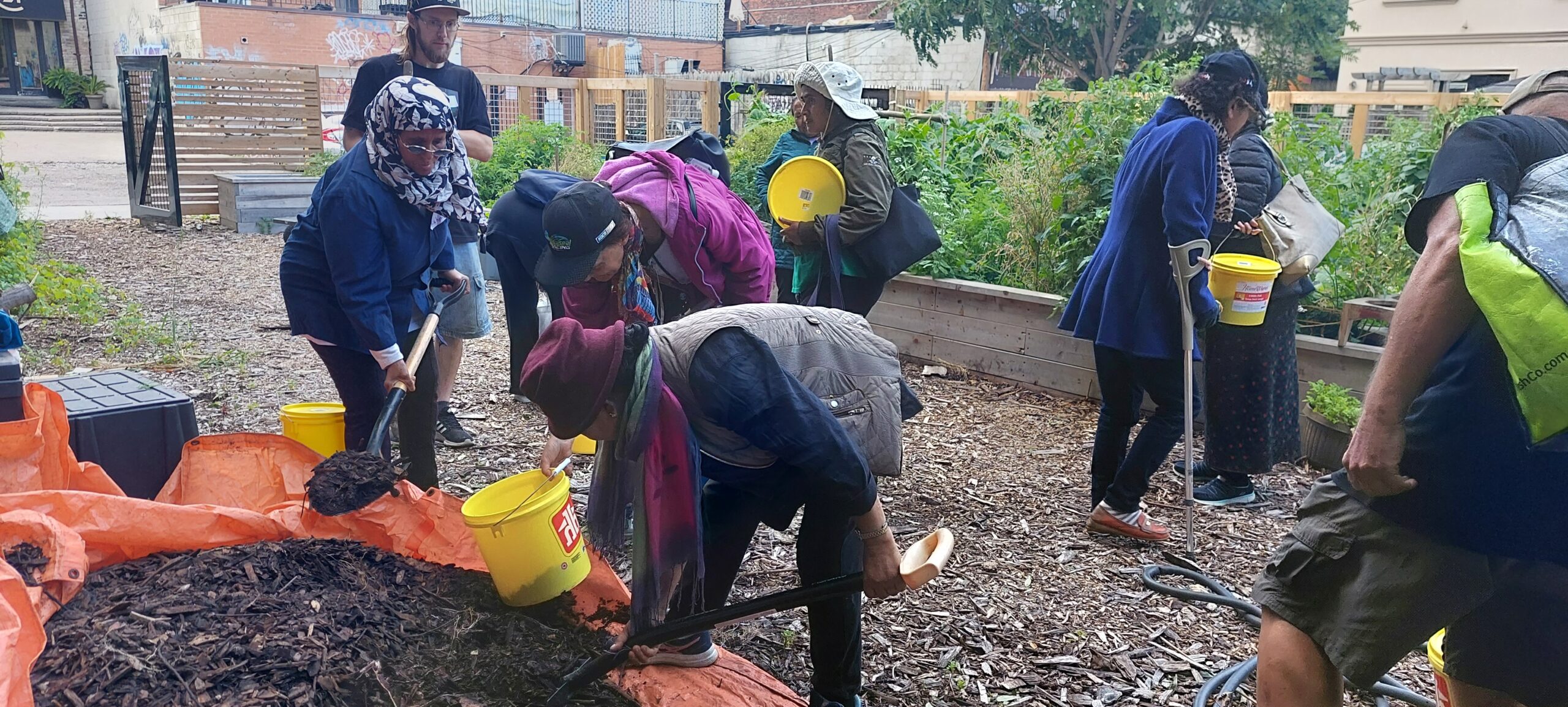
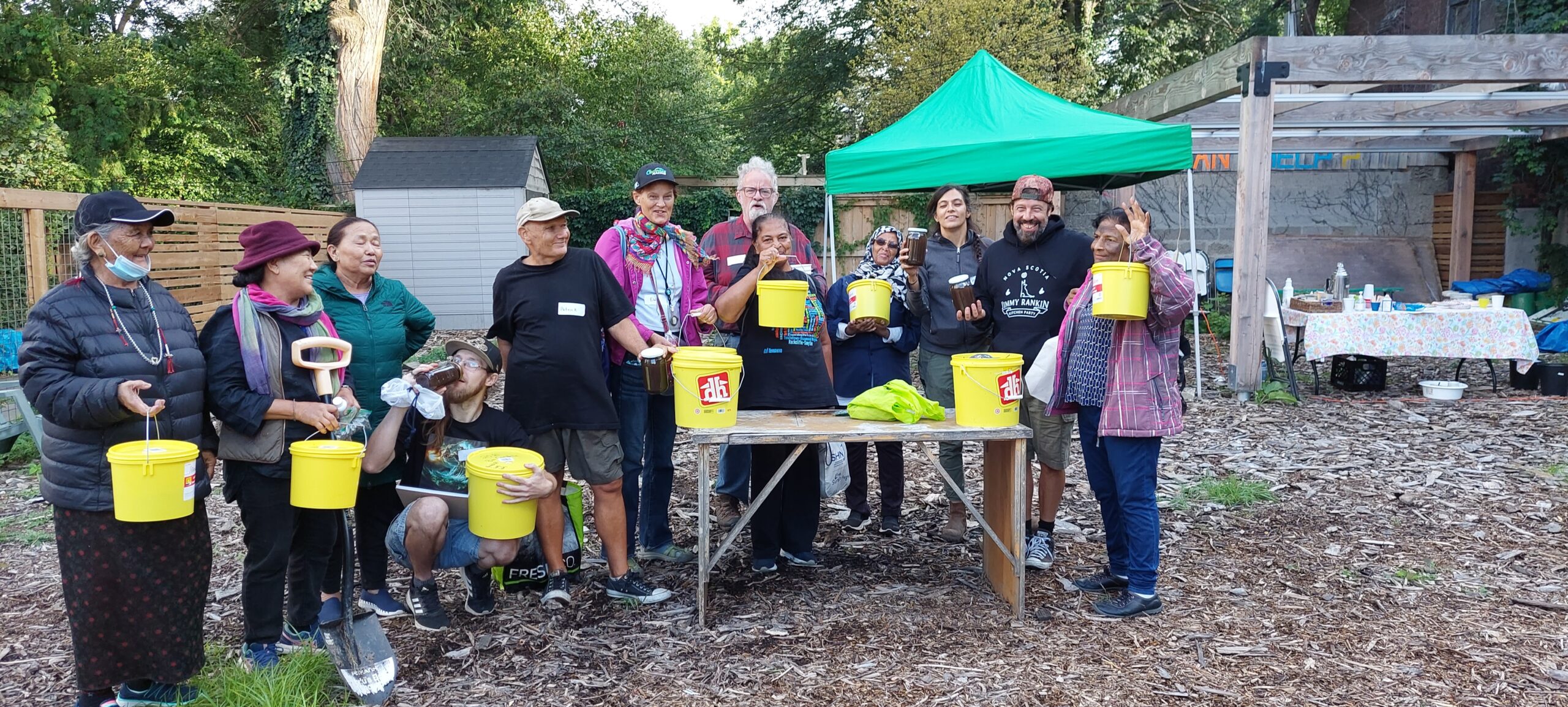
Harvesting Stories
Bonnie Storr Garden by Kimberley Chester
“This garden season of 2023 has been a tremendous year for our community here at Bonnie Storr Community Garden! Thank you to our supporters who have helped create a solid foundation for our garden to grow and thrive! We especially give a huge shoutout to Lisa Valiant at the University Health Network as she has been instrumental in helping us create a solid support system so we can create a lovely community space beside the hospital for our neighborhood in Parkdale.
Our leadership team brought on a new member Olga, who stepped up to successfully executive our administrative tasks. Olga has been an avid gardener for many years and joined the Bonnie Storr Community Garden in 2022. She has been very welcoming to our members, participating regularly in sharing updates, assisting our members in garden tasks, and is always there to share creative solutions if there are gardening challenges to work through.
Olga helped create two workdays, where many of our members came out to work on garden plots and establish a thriving sharing garden in our front yard. There are many plants there that have thrived and grown really high, and the flowers have made the shared garden in front very beautiful.
Saamia, who has been part of our leadership team for some time, has been working hard for her teacher’s certificate and is now in her final year. We, at Bonnie Storr Community Garden, are so very proud of her and look forward to next year when she plans to devote time to homeschooling her children and realizing the vision of a full children’s program.
Kimberley, who has been on the leadership team since the first year, has now returned from her personal leave. Since then, she has been working on creating a framework for our new children’s garden project which we hope to build into a full program for the next garden season. During her time on the leadership team, she has noticed how many children were part of our community garden. Being a parent herself, and having spent some time homeschooling her children, she recognized a need to create a children’s program to help develop and encourage nature learning as part of the Bonnie Storr Community Garden program.
We are looking forward to our children’s garden being in full program mode for next season, including our “Owl Emporium” children’s nature library, a garden/nature journaling project, and a pizza/taco garden plot for children to garden and harvest.
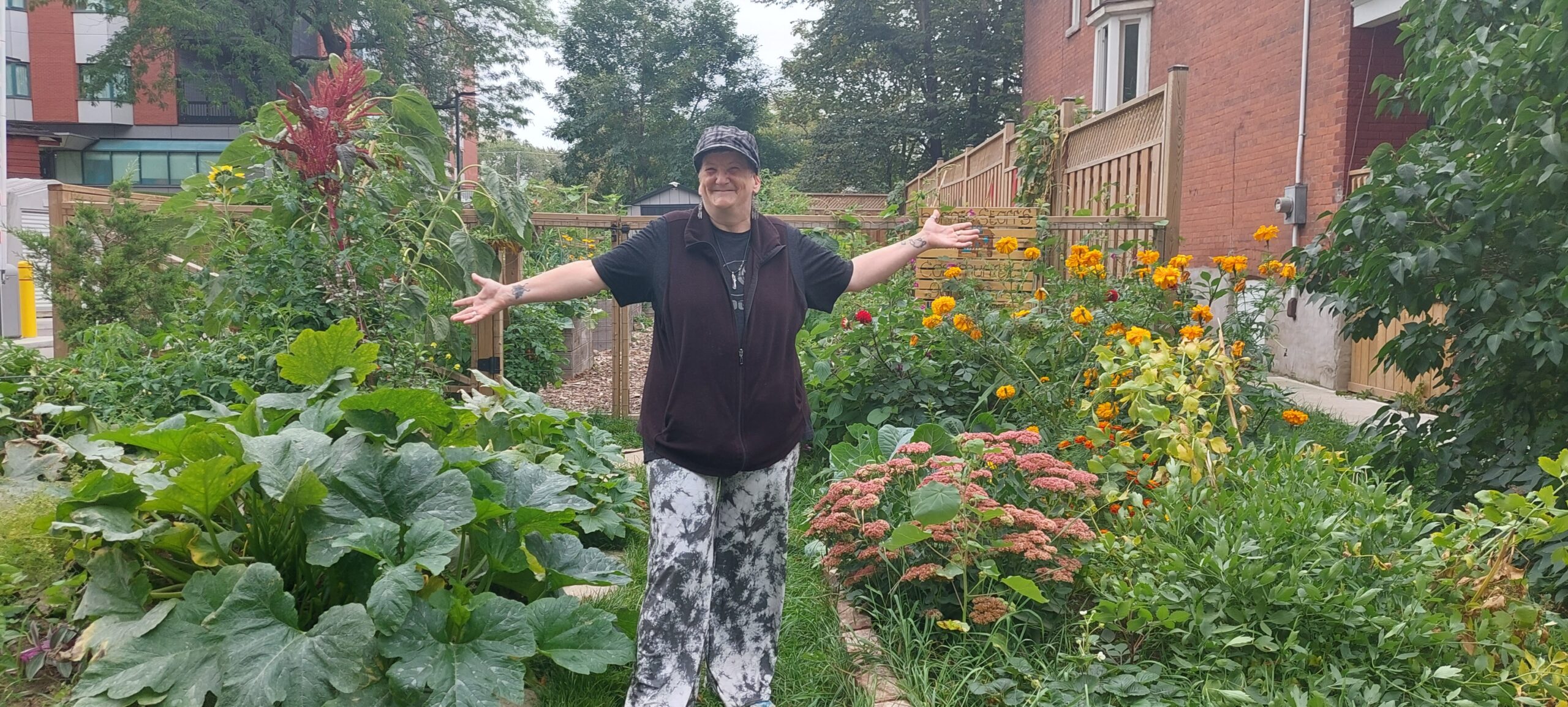
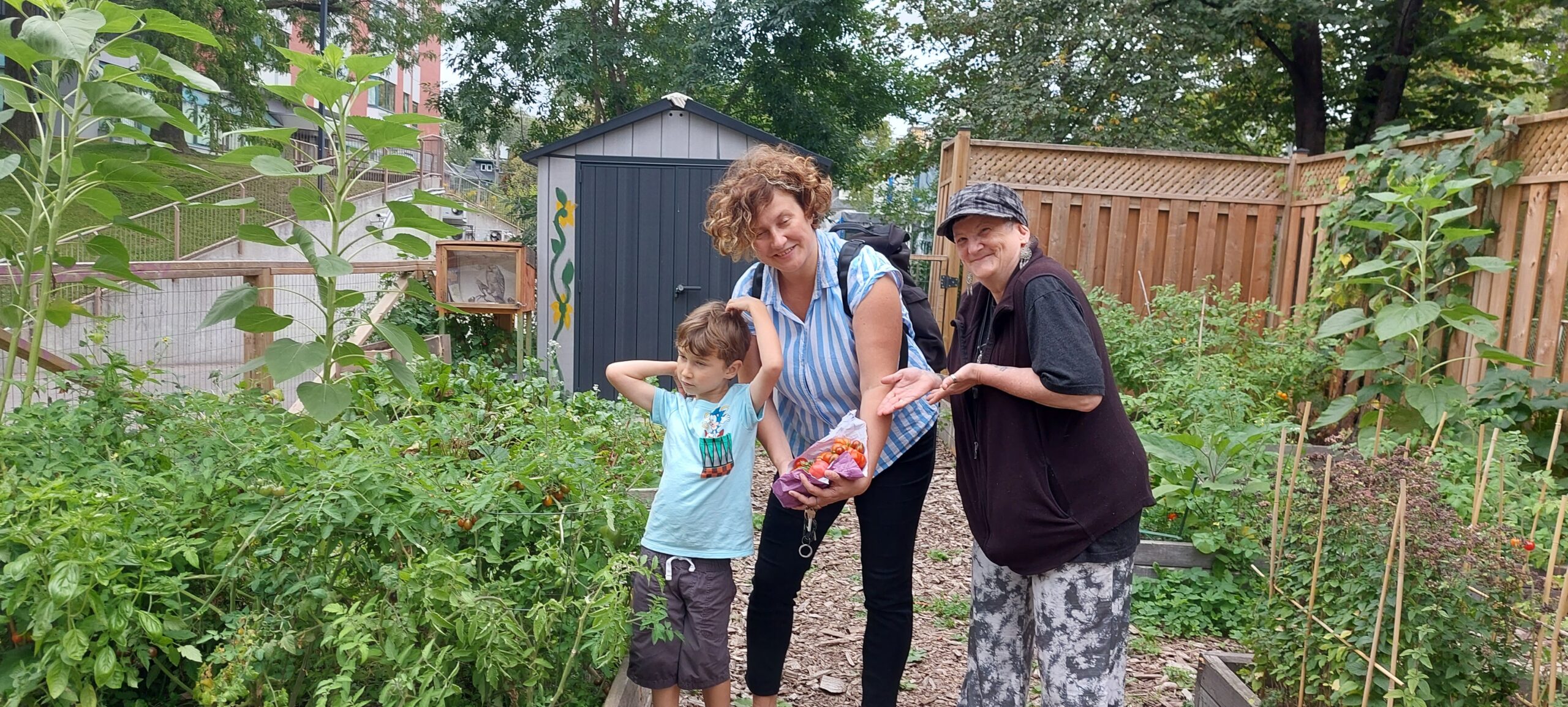
“Our children’s garden nature library was created in 2022 by one of the members Alex in honor of Jen Chester, and daughter Kimberley, one of our leadership team members.
Jen was an avid nature lover and was very much interested in owls, in the Harry Potter book series… so our garden member Alex created the children’s library and named it “The Owl Emporium” in honor of our children members, to encourage them to read nature books while in the garden with their parents.

The Owl Emporium was the first step in creating our children’s nature garden program at the Bonnie Storr Community Garden. Our vision is to encourage regular story time, along with nature journaling and creating pizza and taco gardens for children to enjoy and learn together.
If you have any good-natured books to contribute to our community children’s library, they would be greatly appreciated and happily adopted into our children’s program. Stay tuned for future updates as our children’s program develops” – Kim.
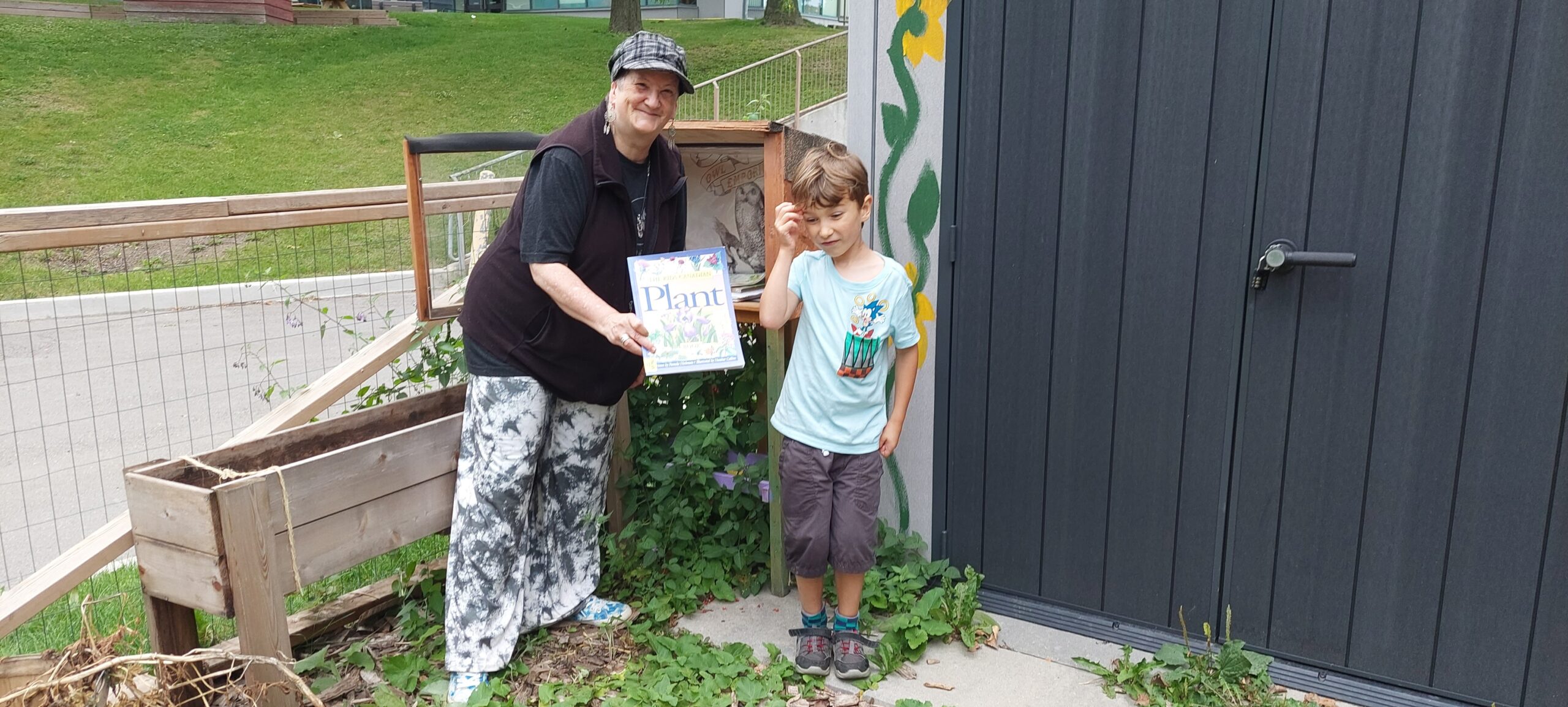
Milky Way Garden By Tish Carnat
“We were at harvest time and were averaging about 25 lbs. of vegetables weekly, which included cucumbers and beans accounting for much of that weight. Also, harvesting kale, bok choy, tomatoes, very leafy celery, and funny-shaped. carrots. The gardeners were proud to bring a portion of this food home to their families and contributing to good nutrition.
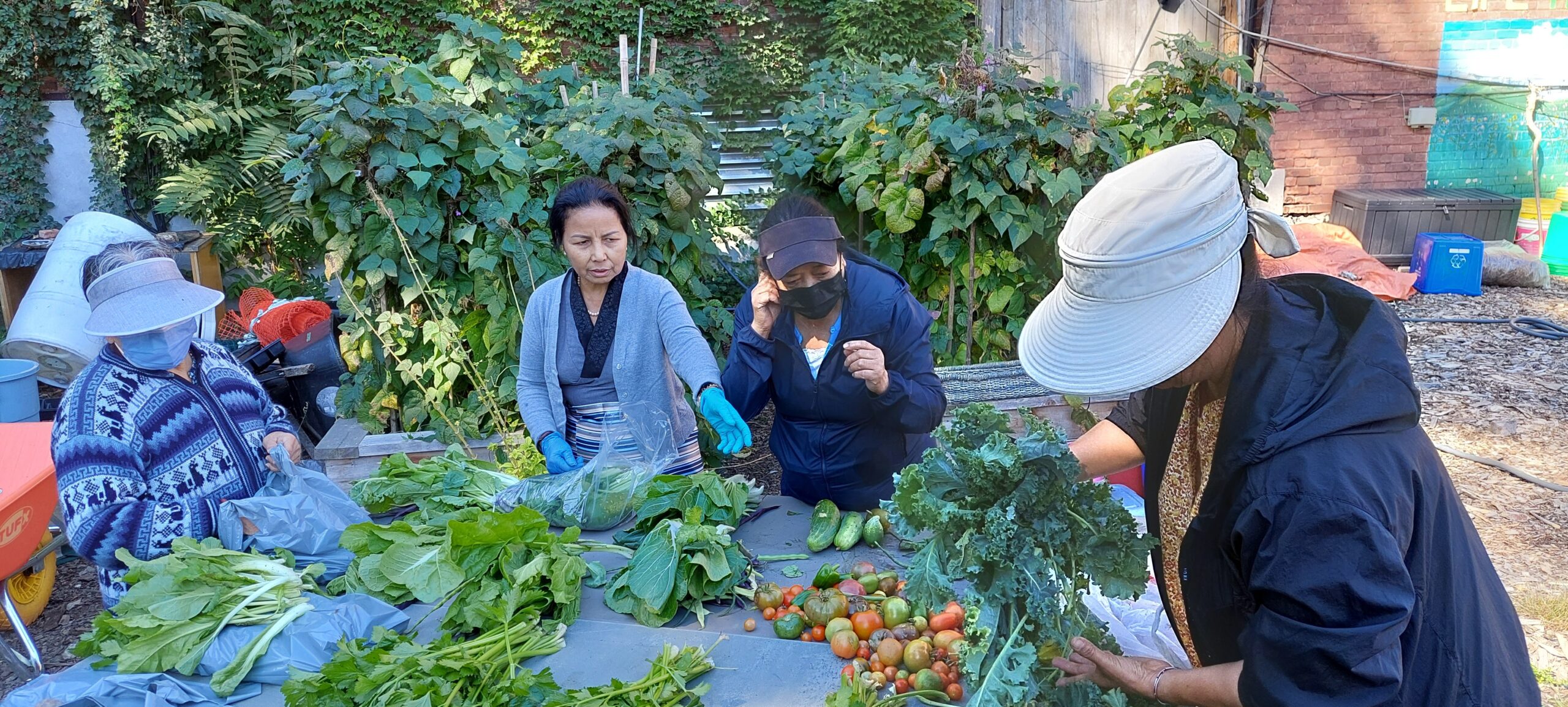
The garden exterior has been greatly enhanced with three beds of a pollinator garden in front of the fence and gate containing beautiful flowers which are already attracting bees, wasps, and butterflies. The gardeners are grateful to be tending the land and look forward to further developments, creating an agricultural community space for all in Parkdale.”

St. Joes Garden. By Peter Gadd
“Being able to have a sanctuary where I can escape from the stresses of everyday life and learn from nature as well as other gardeners, is something that I feel other people need to experience. Everyone deserves a roof over their head and food in their belly. I feel blessed that I currently have both, but it was not always the case. I feel blessed that there are spaces where people can come together and share their passion for gardening, composting, etc. We need more of these though, as there are not nearly enough of them.”
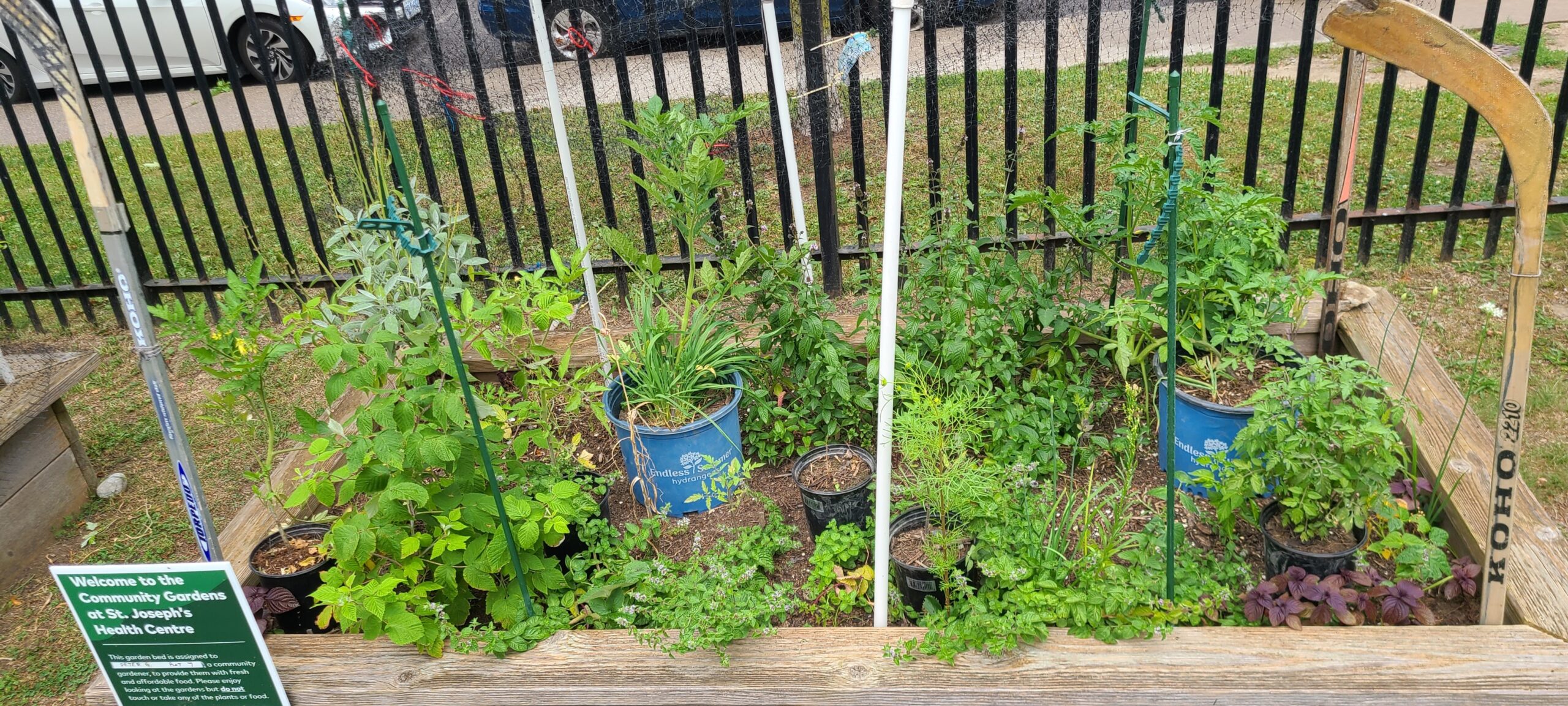
Hope Garden. Stories told through photos. By Aida Maines

Partnerships
My Brother’s Keeper Meal Program by True Daley
“Parkdale has a new grassroots organization aimed at supporting African refugees in the downtown core. My Brother’s Keeper (MBK) Meal Program feeds both the body and soul by providing healthy meals from scratch while creating a safe space for African asylum seekers. Founded by friends True Daley, Ayan Kailie, and Adi Yemane, MBK is an interfaith (Christian, Muslim, Jewish), multilingual and Black female-led group that meets three times a week at Epiphany and St. Mark Anglican Church in Parkdale
The program is run in partnership with Greenest City and was launched in July when the first meal Foul (pronounced FUHL – a popular Eritrean/Ethiopian dish) was prepared and 30 meals delivered to refugees at 129 Peter Street.
Most refugees have since been relocated to shelters, although many have been experiencing health issues related to the meals served there. The food served normally consists of pasta, bread, dairy products, and other carbohydrates. However, some are going without meals due to stomach ulcers, constipation, and high cholesterol.
MBK is run by volunteer cooks from the diaspora who specialize in East African cuisine and are also introducing healthy affordable options from Toronto’s diverse palate.
When asked about the support they’ve received so far, participants stated the following:
“It connects us and allows us to speak our minds. It provides some relief to open up with others”
-Claire
“This program is so helpful not just for us but for all newcomers. We all need someone to lean on so we can integrate.”
– Dennis
“By getting information, now I can use this knowledge to become a plumber. I really appreciate the support.”
– Joseph
Now that a majority have been relocated to Peel region and North York, the focus is to raise funds and use donations to provide seasonal clothing, toiletries, and fresh produce to support those still living in downtown shelters.


A big shoutout to our volunteers from this program who have dedicated their time, energy, passion, and creativity to supporting Greenest City. We appreciate a lot their enthusiasm and accountability.
Gratitude and all the best in your new life in Canada brothers and sisters! You have a place in our hearts!

Support West Neighbourhood House
By giving to West Neighbourhood House this year, you will support neighbours to pursue dreams and contend with today’s economic reality. You will also make it possible for the House to continue addressing social issues like housing affordability, social exclusion, and mental health.
Together, we can help people thrive and deal with hard times!
Show your support by visiting westnh.org/donate.
Stay updated with our activities and programs on our social media including our Facebook page and Instagram! To volunteer and connect with us reach us at admin@greenestcity.ca.
Greenest City is a program of West Neighbourhood House. Read more by visiting their page.


